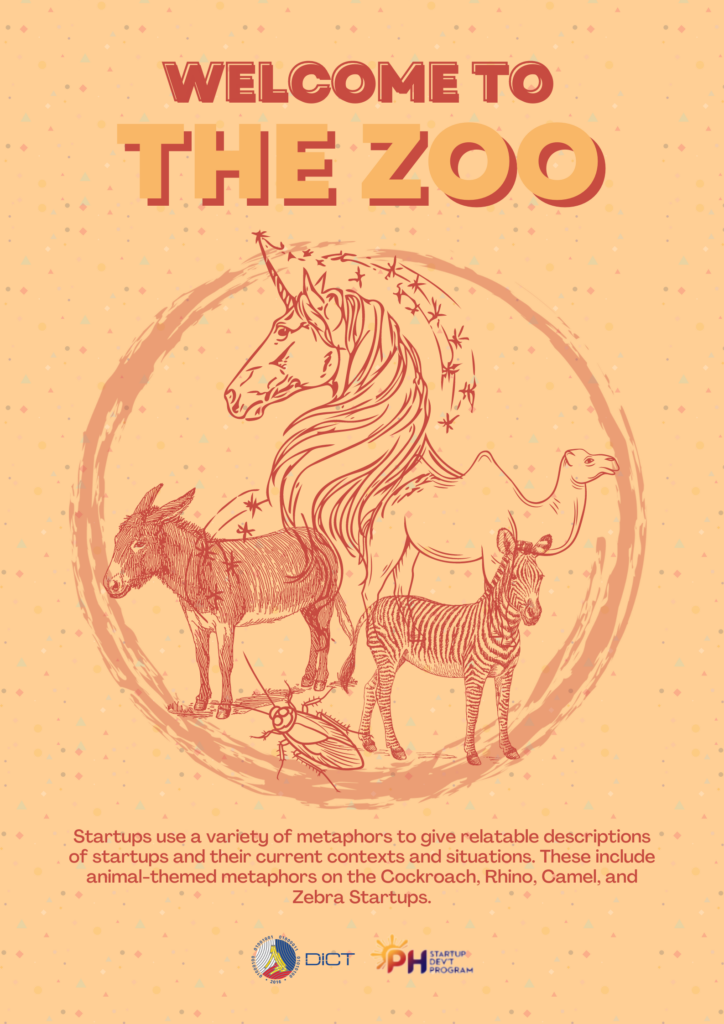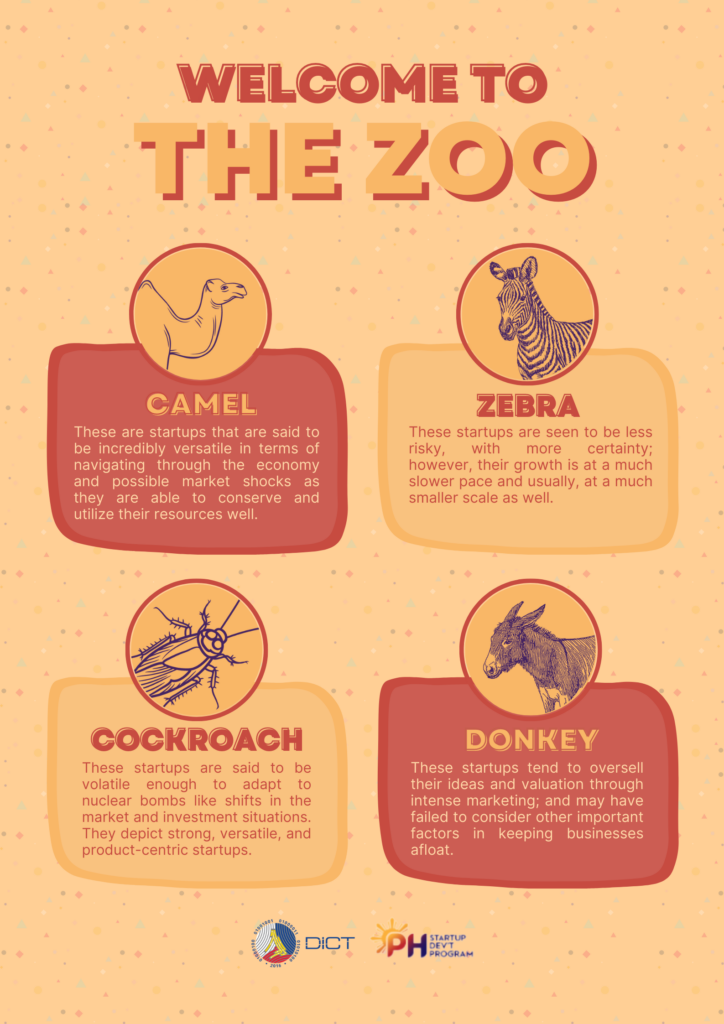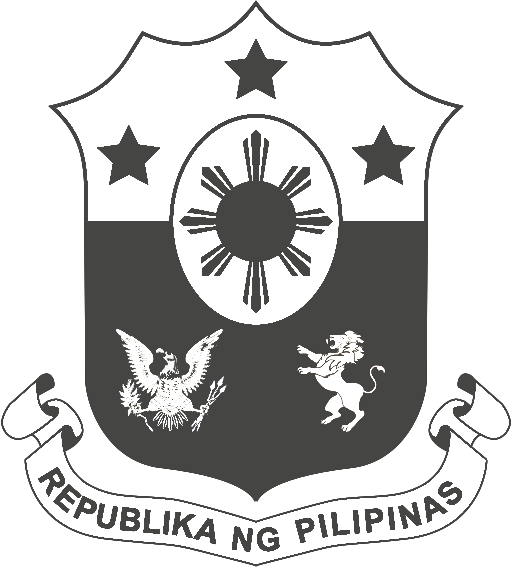Startup Lingo – Welcome to the Zoo: An Overview of Animal Metaphors used by the Industry to Depict Various Startups
Published: December 19, 2022

It cannot be denied that the number of Startups have grown throughout the years. More and more individuals are seeing the value and potential of investing not only their financial resources into the development of a Startup, but also their time, knowledge, and attention.
Naturally, as more Startups are seen within the market, more trends and distinctions are placed to better understand and convey how Startups operate. A widely-used metaphor in the Startup scene is through animals. The most famous of which is the Unicorn for startups valued at at least USD 1 Billion. Slightly less popular, but still prevalent, are the use of Camel, Zebra, Cockroach, and Donkey metaphors that provide a better understanding of Startup mechanisms.
Camels are used to describe startups that are said to be incredibly versatile in terms of navigating through the economy and possible market shocks as they have good unit economics. Like camels, these startups are able to conserve and utilize their resources well – whenever needed. They are not overly dependent on the funding of venture capitalists; and place great priority on their startup’s stability and efficiency rather than speed. In most cases, they prefer growth over profitability as they make an effort to balance growth with cash flow. This term is said to be coined by Alex Lazarov of Cathai Investment when he predicted that Silicon Valley will experience a decline in activity for 2017.
Zebra startups was coined by a group of Zebras Unite Startup Founders last 2017. It was born as a counter-thesis to the ultra-rapid need of unicorn startups’ growth. Unlike unicorns, zebras prioritize sustainable growth while constantly putting to mind the need to provide social and/or environmental solutions. Like zebras, these startups are known to be collaborative and inclusive. They place value in regenerative growth and user success as compared to the unicorn’s hockey stick growth and user acquisition. Zebra startups are seen to be less risky, with more certainty; however, their growth is at a much slower pace and usually, at a much smaller scale as well.

Cockroaches, despite the negative connotation attached to the insect, actually depict strong, versatile, and product-centric startups. Unlike unicorns, cockroach startups’ main focus is on survival, profitability, and sustainable growth over valuation. Just like the insect, these startups are said to be volatile enough to adapt to nuclear bombs like shifts in the market and unstable investment situations. They employ a do-it-yourself philosophy through strict cost control and a lean, low-cost operation. The cockroach metaphor is said to be first mentioned in the 2007 ASES Summit Keynote Speech of Paul Graham at Stanford. These startups are observed to mainly start out as side projects of its founders.
Lastly, donkeys are also used to describe certain startups. Unfortunately, donkeys are not given the same positive light attached to the unicorn, zebra, camel and cockroach startups. Donkey startups are said to be initially unicorn startups that struggled to prove the immense valuation attached to their brand in the earlier stages of funding. These startups tend to oversell their ideas and valuation through intense marketing; and may have failed to consider other important factors in keeping businesses afloat such as customer lifetime, product pricing, margins et cetera.
Ultimately, these metaphors are helpful in trying to understand the different ways at which startups operate and move through the market. However, it is necessary to state that these metaphors are just what they are – mere labels. They are just cues in trying to better understand the complicated but colorful world of startups. It is still the founders, enablers and other startup ecosystem players that determine how their respective startups will go about.
References:
Dumbre, M. (2021, March 9). Which kind of startup you are building – zebra, camel or donkey? [web log]. Retrieved July 5, 2022, from https://www.linkedin.com/pulse/which-kind-startup-you-building-zebra-camel-donkey-mahesh-dumbre/.
Feldberg, J. (2022, January 19). Cockroach startups: What you need to know to succeed and prosper. Jeffrey Feldberg. Retrieved July 6, 2022, from https://www.jeffreyfeldberg.com/cockroach-startups/
Graham, P. (2007, April). The Hacker’s Guide to Investors. Retrieved July 5, 2022, from http://paulgraham.com/guidetoinvestors.html
Honeyman, R. (2020, December 22). Silicon Valley should reward zebras, not unicorns. TechCrunch. Retrieved July 6, 2022, from https://techcrunch.com/2020/12/21/silicon-valley-should-reward-zebras-not-unicorns/
Kalyankar, N. (2021, September 4). Cockroach startup?: How to build a cockroach startup. StartupTalky. Retrieved July 5, 2022, from https://startuptalky.com/cockroach-startup-explained/
Klymenko, A. (2021, January 25). Financial zoo: Cockroach startups, money mules, Bull and Bear Markets. PaySpace Magazine. Retrieved July 5, 2022, from https://payspacemagazine.com/fintech/finances-menagerie-explained/
Lazarow, A. (2020, October 16). Startups, it’s time to think like camels – not unicorns. Harvard Business Review. Retrieved July 5, 2022, from https://hbr.org/2020/10/startups-its-time-to-think-like-camels-not-unicorns
Lazarow, A. (2020, April 27). The new hot startups will be camels, not unicorns. Medium. Retrieved July 5, 2022, from https://marker.medium.com/the-new-hot-startups-will-be-camels-not-unicorns-53d480535916
Oron, Y. (2018, November 7). Forget unicorns. we need more ‘zebra’ startups. Entrepreneur. Retrieved July 6, 2022, from https://www.entrepreneur.com/article/322407
Ramirez, A., & Trenor, R. (2021, June 18). Unicorns vs camels: Startups able to survive in hard times are finding a place. Garrigues Digital. Retrieved July 5, 2022, from https://www.garrigues.com/en_GB/garrigues-digital/unicorns-vs-camels-startups-able-survive-hard-times-are-finding-place
Unicorns, zebras, rhinos, camels and cockroaches – who’s who in the start-up zoo? (2021, October 13). Retrieved July 8, 2022, from https://www.unicorn.de/en/stories/unicorns-zebras-rhinos-camels-and-cockroaches-whos-who-in-the-start-up-zoo/
Zepeda, M. (2017, March 20). Zebra companies offer an alternative to the unicorn fantasy. Quartz. Retrieved July 8, 2022, from https://qz.com/933681/start-ups-shouldnt-try-to-be-unicorns-they-should-be-zebras/

